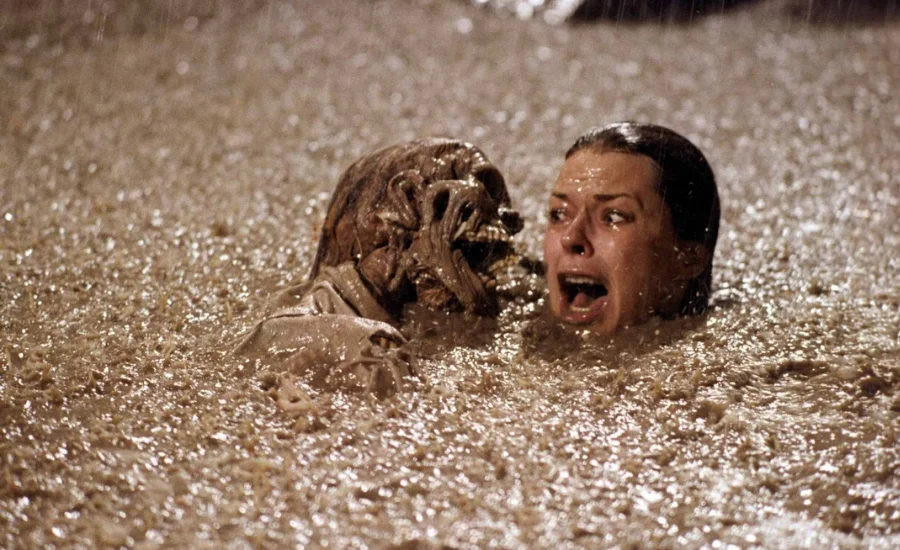In 1982, the horror classic “Poltergeist” shocked audiences with its chilling tale of suburban terror and supernatural disturbances. However, behind the scenes, a controversy brewed over the alleged use of real human skeletons as props, adding a macabre layer to the film’s legacy. Let’s delve into the origins of this claim, explore the truth behind the unsettling revelation, and analyze its profound impact on the film industry and ethical standards in filmmaking.
Origins of the Claim
Rumors circulated post-release that “Poltergeist” employed genuine human skeletons in certain scenes, particularly the haunting pool scene. This sparked discussions on the ethical boundaries of filmmaking.
Unveiling the Truth
Despite anecdotal evidence, conclusive proof of real skeletons’ use remains elusive. Actress JoBeth Williams expressed discomfort with the presence of skeletons on set, yet no further corroboration emerged from cast or crew.
Insights from Spielberg and Crew Responses
Director Steven Spielberg’s admission of real skeletons’ use ignited debates on ethics and practicality within the industry. Crew reactions varied, highlighting the complex moral considerations surrounding prop choices.
Influence on the Film Industry
The controversy prompted reflections on ethical filmmaking practices, with calls for transparency and adherence to regulations governing prop use.
Contemporary Film Production and Ethical Standard
Advancements in technology offer alternatives to controversial props, signaling a shift towards more ethical filmmaking practices.
The Disturbing Trend of Fatalities After Production
Tragic events involving cast members post-release led to speculation about a “Poltergeist curse,” underscoring the emotional toll on those involved in the film’s production.
Outcry from the Public and Industry Response
The revelation spurred demands for accountability and transparency, prompting industry organizations to address ethical guidelines for prop usage.
Legal and Ethical Considerations
Debates over ownership and treatment of human remains in films raised legal and ethical questions, necessitating careful navigation of regulatory frameworks.
The Enduring Impact of the Departed Actors
The tragic fates of several cast members sparked discussions on safety and well-being in the film industry, leaving a lasting imprint on the horror genre.
The Emotional Toll on Cast and Crew
The unsettling atmosphere on set, compounded by subsequent tragedies, underscored the profound impact of production choices on participants.
Behind the Curtain: The Choice for Authenticity
The decision to use real skeletons for realism reflects a pragmatic yet ethically contentious approach to filmmaking.
Wider Impact on Movie Making
The controversy underscores the importance of cultural sensitivity and responsible prop usage in film representation.
Encouraging Transparency and Responsibility
Calls for openness and adherence to ethical standards urge filmmakers to prioritize integrity in their creative endeavors.
Understanding Viewer Anxiety: What Truly Disturbs Audiences?
Explorations of horror film psychology shed light on the allure of realism and societal fears depicted on screen.
Advancements in Special Effects Technology and Their Influence
Technological innovations offer ethical alternatives to controversial props, reshaping the landscape of filmmaking.
Delving into the Fascination with Horror and Realism in Society
The controversy prompts reflections on society’s fascination with authentic scares and the enduring popularity of horror films.
The Impact of the Poltergeist Controversy on Future Filmmaking
Lessons learned from the controversy underscore the importance of ethical integrity in filmmaking, guiding aspiring filmmakers towards responsible practices.
Final Words
As the film industry grapples with ethical dilemmas, the legacy of “Poltergeist” serves as a cautionary tale, emphasizing the need for honesty, respect, and integrity in cinematic storytelling.
This comprehensive exploration highlights the multifaceted implications of the controversy surrounding “Poltergeist,” urging stakeholders to prioritize ethical considerations in filmmaking endeavors.
Stay in touch to get more updates & news on .Latest Dash !

